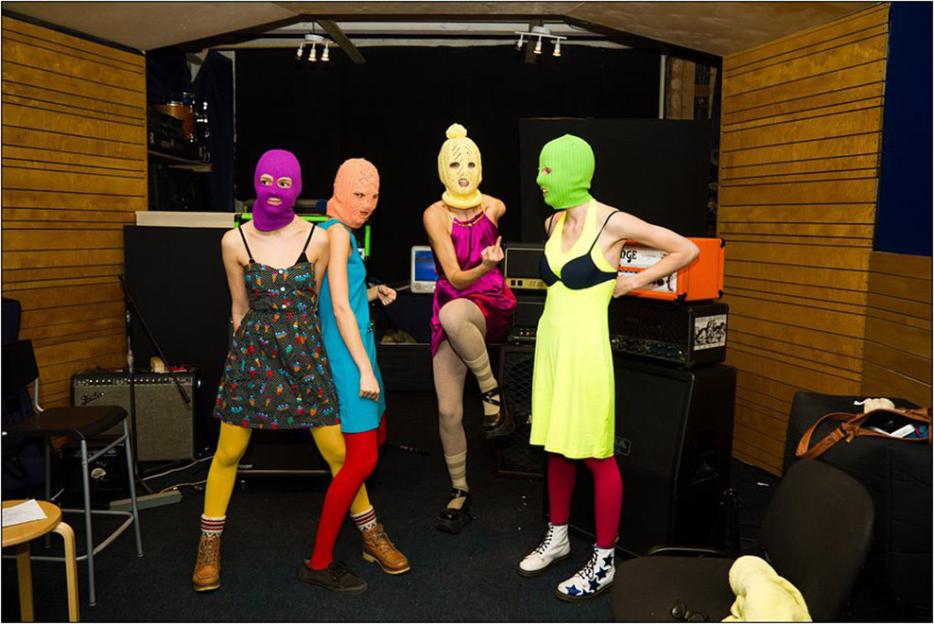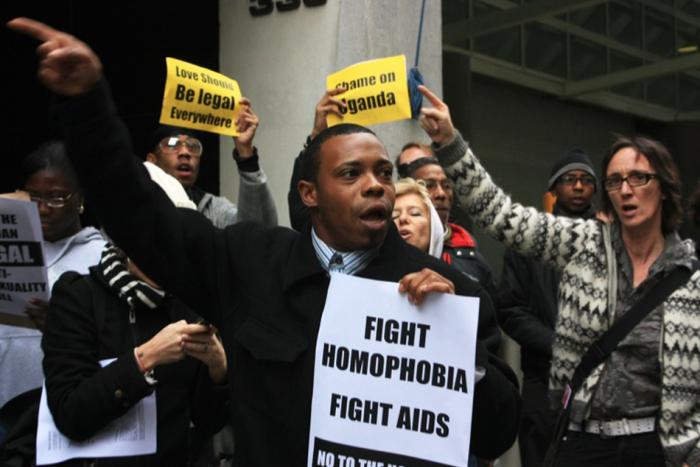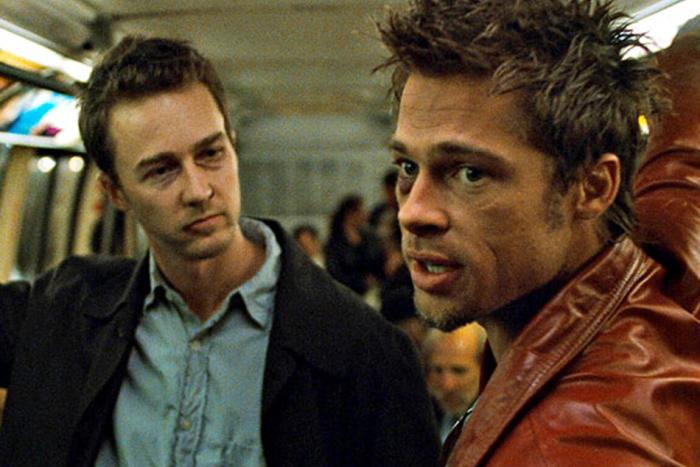Perhaps no story better encapsulates the poisonous state of Russian politics and society under the Putin regime than that of balaclava-clad art provocateurs Pussy Riot. The three members arrested in the wake of the group’s now infamous protest-cum-performance at Moscow’s Cathedral of Christ the Saviour in February 2012—Nadya Tolokonnikova, Maria Alyokhina, and Yekaterina Samutsevich—have run almost the full gamut of the state’s instruments of repression. To critics of the Putin regime, those instruments are all too familiar: the ruthless targeting of opposition voices by security forces and street thugs; a pro-Kremlin news media that describes legitimate protestors as “foreign agents”; vindictive prosecutions by show trial; and the dire punishments meted out at remote penal colonies unreconstructed from the Soviet era. And yet, in the tradition of all great political dissenters, the women’s provocations and principled defiance have unmasked the true nature of power in Putin’s Potemkin Russia, while also offering a possible blueprint for resistance.
Published on the eve of the Sochi Winter Olympics, and barely two months after Tolokonnikova and Alyokhina’s release from prison, Masha Gessen’s Words Will Break Cement makes for a fitting companion piece or sequel to her previous book, The Man Without a Face, an unflinching look at Putin’s rise to power from mid-level KGB functionary to Russia’s most powerful man. Taken together there’s arguably no more piercing a record of Russia’s relapse into autocratic rule.
The 47-year-old Gessen was born in Moscow but moved with her family to the United States when she was in her teens. She returned to Russia in the 1990s to work as a journalist, and eventually became deeply involved in the country’s LGBT movement. In December Gessen moved to the U.S. with her spouse and two children, in reaction to Russia’s new “anti-gay propaganda” laws. (Her arrival in the U.S. has been met with some of the same challenges known to other Russian émigrés.)
Pussy Riot was already on Gessen’s radar before the performance of “Punk Prayer” at the Cathedral, thanks to some of their previous actions; once they were arrested she sensed immediately how big a story this was going to be. “It was the first example of such an outsized reaction on Putin’s part,” she says. “And of course they were arrested on the day that Putin was supposedly to be elected to his third term as president.” Gessen first followed the case as a fellow activist. It was only when the trial arrived was Gessen convinced she had to write up their story.
That Gessen’s telling of the Pussy Riot story comes across so vividly, and with such insight into the women’s lives, is something of a feat given that she had less than ideal access to her subjects. Only Sumutsevich was free (though on parole) and able to sit for lengthy interviews. Otherwise, Gessen made the most of prison correspondence with Tolokonnikova and Alyokhina (at least what got through the censors), court transcripts, her own experience covering Russian politics, and all the reporting that mushroomed around the women’s case. But the book’s documentary-like pastiche of source materials makes for a more layered, gripping account.
“Maybe I’m just informed now by having written several books about people who were either totally inaccessible or very hard to access,” says Gessen. The publicity-shunning Russian mathematician Grigori Perelman refused to talk to her for a biography about him, Perfect Rigor. More formidably elusive was Putin himself for The Man Without a Face—though Gessen did eventually get one appropriately surreal interview with the president, included as an afterword in the book’s paperback edition. She actually prefers a good distance from her subjects. “My bias,” Gessen says, “is that people are not actually great sources of information about themselves.”
Gessen spoke to Hazlitt by phone from New York, just prior to the opening of the Sochi Olympics.
--
After the performance of “Punk Prayer” at the Cathedral of Christ the Saviour, Pussy Riot members Nadya Tolokonnikova and Maria Alyokhina were charged with “felony hooliganism.” According to Russian law hooliganism is defined as much more than mere vandalism, physical assault, or creating a public disturbance. Could you explain what it means?
Hooliganism is defined as a disruption of the social order. And it becomes a felony when it is perpetrated either with the use of arms or violence, or if it’s a hate crime. Eventually they were convicted of committing a hate crime against Russian Orthodox believers.
To prove the charge the prosecution paraded a series of witnesses. All of them talked about how terribly hurt they were, how painful it was for them to watch the performance, and see the clips on YouTube—which apparently many of them did, endlessly, sort of prolonging their pain.
What the prosecution aimed to prove was that Pussy Riot was motivated by hatred for Russian Orthodox believers. To avoid the appearance of it being a political trial, witnesses were not allowed to quote the actual lyrics of the so-called “Punk Prayer.” The lyrics of which were, “Mother of God, chase Putin out.” The name Putin was not supposed to be mentioned in the hearings. But Maria managed to get it once into the cross-examination when she asked her best friend to testify the fact that she didn’t like Putin. Other than that, Putin wasn’t really mentioned. The women themselves found this business of being accused of and convicted of committing something out of hate incredibly painful. They did not have hate in their hearts.
It’s thrilling how you describe the performance at the Cathedral of Christ the Saviour, and then the days immediately after the performance, when Nadya, Kat, and Maria went into hiding. Although the performance was quickly broken up by security, it wasn’t clear how much trouble the women were actually in. They even felt silly about being in hiding when maybe nobody was looking for them. Do you have any insight into when the authorities decided to treat the performance as a crime, and why?
It appears that the case was opened three or four days after the actual performance. That’s when it became a criminal investigation, and when the big guns were turned on them. From that point on authorities were searching for them high and low. They were searching their apartments, Nadya’s long-abandoned dorm room. It was like a full on search for an extremely dangerous criminal.
Why did this happen? There’s this idea that I can neither confirm nor deny that the Patriarch of the Russian Orthodox Church called Putin and demanded that something be done. This is conceivable; they have the kind of relationship where one could pick up the phone and call the other, and the other would take action. Whether or not that actually happened we have no way of knowing.
It seems very clear that both the Patriarch and the church in general took extreme offence, and that Putin took extreme offence. Putin has a history of vengeful prosecution. In this particular case I think they became for him a stand-in for the entire protest movement, which he perceived as a personal attack and a personal affront. And these girls had really gone too far, so they needed to be punished. And of course they were arrested on the day that Putin was supposed to be reelected to his third term as president.
How would you characterize the relationship between Putin and the Orthodox Church?
It’s a copacetic, symbiotic relationship. Putin is a former KGB officer, and as far as we know the Patriarch of the Russian Orthodox Church was a [KGB] informant, as were most clergies, though not all clergies [during the Soviet period]. Religious activity was extremely restricted then but some churches, and some synagogues and mosques, were allowed to operate under the very close control of the KGB. The entire church hierarchy in Russia right now comes from that period. It comes from that cadre of highly placed priests who were informing for the KGB. So these guys come from the same corporation. And they’re tight.
Is it fair to say the resurgence of the Russian Orthodox Church has in some sense happened in concert with Putin?
I think it’s been an organic evolution for both of them. Putin came in wishing more than anything else to take Russia back in time; the church had a similar agenda. As time went on, they found they had more and more in common in that sense, and once Putin came under attack the Patriarch realized that the church was being challenged too. They basically turned their common cause into a kind of holy war against modernity. That’s why Pussy Riot was brought down so crudely, and that’s why this whole anti-gay crusade has gotten underway.
You write about how the Pussy Riot trial in many ways reprised the old Soviet show trials.
There were a number of aspects. Of course one is the relationship between the judge and the prosecution, where the judge actually feels that she is working for the state, and so she works in concert with the prosecutors. There’s no concept that this is wrong, that it’s not the role that the judge should be assuming. This is very typical for Russian courts, and they inherited it directly from the Soviet court.
What I was most interested in was what was happening with the defendants themselves, because there are really two distinct approaches that Soviet dissidents developed to Soviet courts. One was to try to pretend that the accused wasn’t in actual court, to try and turn the entire hearing into an ongoing protest by trying to use the legal tools for the purpose that they were supposed to be used for. To have a fair trial, to defend oneself, to have an adversarial process. So they would study the law, they would hang on to every procedural complication, and they would be very active in trying to use the law as it should be used.
Another approach is to sort of say to the court, “I do not recognize your authority over my life, over my actions, because you are not a real court. So my speeches will not be addressed to the court, they’re going to be addressed to the public.” A great example of that is Natan Sharansky. When he was giving his closing argument in a Soviet court, he gave a terrific speech while turned away from the court but facing the audience. When he was done he turned back to the judge and said, “I have nothing to say to you.”
Nadya and Maria each took different approaches.
Maria was very much the technicality person, the procedural person. Unlike the defence lawyers who were just swimming in a sea of Twitter and not quite realizing what’s going on in the courtroom.
Nadya very much became the Sharansky type of person. She spent a very long time, and sleepless nights, drafting statements. Her closing statement is extraordinary. It’s an amazing political speech. The title of the book comes from that closing statement—she says, “Words will break cement,” which is actually pulled from Solzhenitsyn. So she was referring directly to that legacy of Soviet dissidence that they are part of. And reaffirming hope by saying that she believes in the end that words will break cement.
The third defendant, Kat—I think to call things what they are, she was slipping into a state of indifference that could also be called depression. She wasn’t going to spend a long time drafting her closing statement. It was actually very short, and I thought also very poignant in it’s own way.
Writing about Voina, the activist-art group that eventually grew into Pussy Riot, you talk about their need to confront the “language of the lies.” It’s a direct reference to the propaganda of the Soviet era, and how many of those same lies have been reconstructed and reinforced under the Putin regime. With language so corrupted, you suggest there is a danger, too, that the “language of confrontation” is also suspect; there are no meaningful words left. Could you elaborate? How did Voina and Pussy Riot try to develop a new language of resistance?
This is actually something that I’ve been thinking about obsessively for the last couple of years, both in connection with Pussy Riot and not, because I think it’s a huge problem, it’s debilitating, and I’m not sure that there is a solution. The Soviet Union was a very scary society, very much like the society described in Yevgeny Zamyatin’s We or Aldous Huxley’s Brave New World, where there’s a kind of language, official language, that basically calls everything its opposite. Black becomes white, jail becomes freedom, totalitarianism becomes democracy, and hate becomes love.
That was the case in the Soviet Union for seven decades. I grew up calling the country where I was growing up one of the freest in the world, and talking about our happy childhood, about our democracy. Meanwhile my parents participated in farcical elections because otherwise they would have been in trouble. Of course, elections were not elections. And then something breaks. Language somehow boils through and the roof is blown off; language is rehabilitated. It wasn’t ever rehabilitated fully. As someone who can write in both Russian and English, I had to be careful saying anything that was particularly ideological. I always felt much more constricted writing in Russian than I did in English for that very reason. That a lot of the meaningful words are suspect.
Things turned back again when Putin came in. One of the most damaging things he has done is destroying public conversation in Russia—not only bringing back that Soviet speak that calls un-freedom freedom, but also discrediting everything that happened in the late eighties and early nineties. A good example of this is that Putin has just directed the group that’s working on the unified history textbook—which is mandatory for use in all Russian schools—he’s directed them to take all the ideological language out. Now that sounds pretty good, right? But what that actually means is any judgment contained in the textbook will have to be removed. Anything that could be interpreted as being negative about the Stalin era, about the Gulag, about the fight against dissidents, all of that will have to go under the guise of removing ideological language.
Basically the things that came out into the open after the Soviet Union fell are being systematically deleted and discredited. This is the situation in which Pussy Riot matured, and you have to remember Maria and Nadya are 24 and 25 years old respectively. They were small children when Putin came into power. They’ve been living this all their lives and they don’t know a different reality. So they commence their search for a way to confront lies in a country where there’s no language. Nadya talks about that in her closing statement, she says that they chose punk as a place of maximum sincerity.
In December, Maria and Nadya were granted an early release from prison—a move widely viewed as a cynical attempt by Putin to defuse international criticism ahead of the Sochi Winter Olympics. While this whole Pussy Riot story was playing out, the country was gearing up to host what will be, at $51 billion, by far the costliest Olympic games ever. Have you done any reporting on the preparations for Sochi and the corruption allegations?
I haven’t done very much reporting, actually. The last reporting I did on Sochi was almost three years ago. It was a piece on corruption in the construction projects, and my main source was a large contractor who has since fled to England. He was willing to be named and go on the record, willing to give me a lot documents that showed the extent of corruption. But then I said, “Will you go to Sochi with me? I want to show me around, take me to these places where these things were done and these documents apply.” He said, “No, are you kidding me? I’ll get killed, you’ll get killed. It’s too dangerous!” Most people I talked to for that kind of story, the interview would take place in a hotel somewhere in a third country, not where they were living.
Should I assume there’s been very little reporting in Russian media then about the costs of the games?
There’s been more recently on the corruption, some of it’s been pretty good. I mean, as good as it can be. But there’s a big problem with corroboration and sourcing because of how scared people are, and what good reasons they have to be scared.
What are you watching for at the Olympics?
I’m much more concerned about what happens after the games. I think after the games, all bets are off. The crackdown continues, and it gets much more intensive, and also Putin lashes out because he feels he’s been forced to make some concessions recently, like release all these political prisoners. I’m much more concerned about what happens on February 24th.






